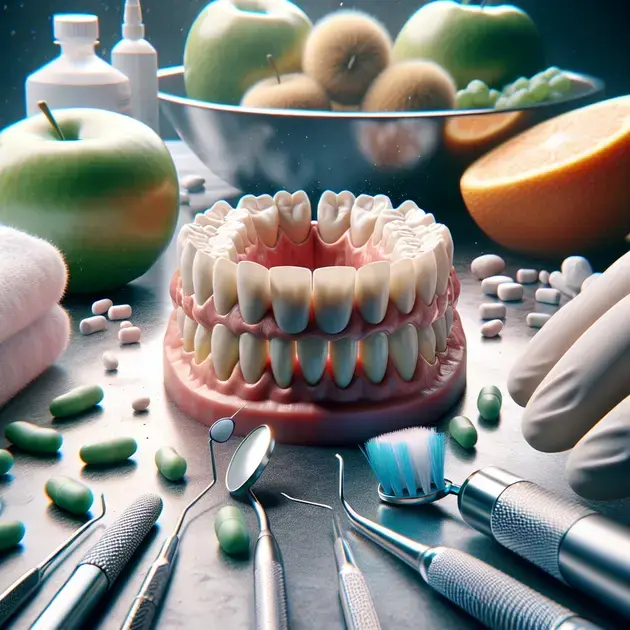Are you looking to discover the best tips for healthy teeth and gums? In today’s fast-paced world, maintaining good dental health is essential for overall well-being. From proper brushing techniques to the benefits of flossing, there are numerous strategies that can help you achieve a bright and healthy smile.
With advances in dental technology and an increased awareness of the importance of oral health, there are now more resources available than ever to help you care for your teeth and gums. By following these expert tips and making oral hygiene a priority, you can enjoy a beautiful smile for years to come.
Expert Tips for Healthy Teeth and Gums
Keeping your teeth and gums healthy is essential for overall oral health. Here are some expert tips to help you maintain a healthy smile:
1. Brush and Floss Daily
Brushing your teeth twice a day and flossing regularly is crucial for removing plaque and preventing cavities. Use a soft-bristled toothbrush and fluoride toothpaste to clean your teeth effectively.
2. Use Mouthwash
Adding a mouthwash to your oral hygiene routine can help kill bacteria and freshen your breath. Look for an antiseptic mouthwash with fluoride to protect against cavities.
3. Eat a Balanced Diet
Your diet plays a significant role in your oral health. Include plenty of fruits and vegetables, limit sugary and acidic foods, and drink plenty of water to keep your mouth hydrated.
4. Visit Your Dentist Regularly
Scheduling regular dental check-ups is crucial for detecting and preventing oral health issues. Your dentist can provide professional cleanings and identify any potential problems early on.
5. Avoid Tobacco Products
Smoking and using tobacco products can harm your teeth and gums, leading to gum disease and oral cancer. Quitting tobacco can improve your oral health and overall well-being.
The Importance of Proper Oral Hygiene
Proper oral hygiene is fundamental for maintaining a healthy mouth and preventing dental problems. Understanding the importance of good oral care can help you establish a solid dental routine:
1. Prevents Tooth Decay
Brushing and flossing regularly can prevent plaque buildup, which is a leading cause of tooth decay. Maintaining good oral hygiene habits can help protect your teeth from cavities.
2. Prevents Gum Disease
Gum disease can lead to inflammation, bleeding, and eventually tooth loss if left untreated. Proper oral hygiene, including regular brushing and flossing, can help prevent gum disease.
3. Freshens Breath
Bad breath can be a sign of poor oral hygiene. By keeping your mouth clean with regular brushing, flossing, and using mouthwash, you can maintain fresh breath and confidence.
4. Improves Overall Health
Poor oral health has been linked to various systemic diseases like heart disease and diabetes. Taking care of your teeth and gums can contribute to better overall health and well-being.
5. Boosts Self-Esteem
A healthy smile can enhance your confidence and self-esteem. By practicing proper oral hygiene, you can feel proud of your smile and make a positive impression.
Advancements in Dental Care
With technological advancements in dental care, patients now have access to innovative treatments and procedures that can improve their oral health. Here are some notable advancements in dental care:
1. Digital Impressions
Dental practices are increasingly using digital impressions to create precise and accurate molds of patients’ teeth. This technology eliminates the need for messy traditional impression materials.
2. Laser Dentistry
Laser technology is being used in various dental procedures, including gum disease treatment, cavity detection, and teeth whitening. Laser dentistry offers precise results and faster healing times.
3. Dental Implants
Dental implants have revolutionized the field of restorative dentistry by providing a permanent solution for missing teeth. Implants look and function like natural teeth, improving both aesthetics and oral function.
4. Tele-Dentistry
Tele-dentistry allows patients to consult with dental professionals remotely, enabling access to care and advice from the comfort of home. This technology is especially useful for follow-up appointments and minor dental issues.
5. 3D Imaging
Advanced 3D imaging technology is used for accurate diagnosis and treatment planning in various dental procedures, such as root canals, orthodontics, and oral surgery. This technology improves efficiency and precision in dental care.
Maintaining a Balanced Diet for Oral Health
When it comes to oral health, what you eat plays a significant role in the health of your teeth and gums. One common mistake people make is not paying enough attention to their diet and its impact on their oral health. Maintaining a balanced diet that is rich in nutrients is essential for keeping your teeth and gums healthy. By including a variety of foods in your diet, you can help prevent dental issues such as cavities, gum disease, and tooth decay.
Eating a Variety of Nutrient-Rich Foods
One of the key aspects of maintaining a balanced diet for oral health is to consume a variety of foods that are rich in essential nutrients. Foods such as fruits, vegetables, whole grains, lean proteins, and dairy products can provide the necessary vitamins and minerals that help keep your teeth and gums strong and healthy. Including foods that are high in calcium, phosphorus, and vitamin C can also promote good oral health.
Avoiding Sugary and Acidic Foods
Another common mistake people make is consuming too many sugary and acidic foods, which can be harmful to the teeth. Sugary foods and drinks can contribute to tooth decay and cavities, while acidic foods can erode the enamel on the teeth, leading to sensitivity and other issues. Limiting the consumption of sugary and acidic foods can help protect your teeth and gums from damage.
Drinking Plenty of Water
Staying hydrated is essential for good oral health, as water helps rinse away food particles and bacteria that can lead to plaque and tooth decay. Drinking plenty of water throughout the day can also help stimulate saliva production, which plays a crucial role in maintaining healthy teeth and gums. Aim to drink at least eight glasses of water a day to keep your mouth hydrated and your oral health in check.
Seeking Professional Guidance
While maintaining a balanced diet is important for oral health, it is also essential to seek professional guidance from a dentist or nutritionist. They can provide personalized recommendations based on your specific oral health needs and help you make informed decisions about your diet. Regular dental check-ups and cleanings are also crucial for preventing and addressing any potential oral health issues.
Practicing Good Oral Hygiene
In addition to maintaining a balanced diet, practicing good oral hygiene habits is essential for keeping your teeth and gums healthy. Brushing your teeth at least twice a day, flossing daily, and using mouthwash can help remove plaque and bacteria that can cause dental problems. By combining a balanced diet with proper oral hygiene, you can significantly improve your oral health and reduce the risk of developing dental issues.
Incorporating Natural Remedies for Stronger Teeth and Gums
When it comes to strengthening teeth and gums, natural remedies can be a great addition to your oral care routine. Many people make the mistake of relying solely on commercial dental products, overlooking the benefits that natural remedies can offer. Incorporating natural remedies into your daily routine can help promote stronger teeth and gums, while also reducing the risk of oral health issues. Here are some effective natural remedies to consider:
Oil Pulling with Coconut Oil
Oil pulling is an ancient practice that involves swishing oil around in your mouth to remove bacteria and promote oral health. Coconut oil is a popular choice for oil pulling due to its antimicrobial properties and pleasant taste. By swishing a tablespoon of coconut oil in your mouth for 15-20 minutes each day, you can help strengthen your teeth and gums, reduce plaque buildup, and freshen your breath.
Green Tea for Oral Health
Green tea is known for its numerous health benefits, including its positive effects on oral health. Green tea contains antioxidants and polyphenols that can help reduce inflammation in the gums, fight bacteria in the mouth, and promote overall oral health. Drinking a cup of green tea daily can help strengthen your teeth and gums, while also freshening your breath and preventing oral infections.
Herbal Mouthwashes
Commercial mouthwashes can sometimes contain harsh ingredients that may be irritating to the gums and oral tissues. Instead, consider using herbal mouthwashes that are made from natural ingredients such as mint, chamomile, and eucalyptus. These herbal mouthwashes can help freshen breath, reduce bacteria in the mouth, and promote healthier gums. By incorporating herbal mouthwashes into your oral care routine, you can support stronger teeth and gums in a gentle and natural way.
Clove Oil for Toothaches
Clove oil has been used for centuries as a natural remedy for toothaches and oral pain. Clove oil contains eugenol, a compound that has analgesic and antibacterial properties, making it effective for reducing toothache pain and fighting oral infections. Applying a small amount of clove oil to the affected area can help alleviate discomfort and promote healing. However, it is essential to use clove oil sparingly and dilute it properly to avoid irritation.
Vitamin D Supplements
Vitamin D plays a crucial role in maintaining strong teeth and gums, as it helps regulate calcium levels in the body and promotes bone health. While sunlight is a natural source of vitamin D, some people may require additional supplements to meet their daily needs. Taking vitamin D supplements as directed by a healthcare provider can help support oral health, improve bone density, and reduce the risk of dental issues such as tooth decay and gum disease.
Conclusion
In conclusion, maintaining a balanced diet is vital for optimal oral health. The foods we consume directly impact the health of our teeth and gums, with a balanced diet rich in nutrients playing a crucial role in preventing dental issues such as cavities, gum disease, and tooth decay. By incorporating a variety of nutrient-rich foods like fruits, vegetables, whole grains, lean proteins, and dairy products, we can ensure that our teeth and gums receive essential vitamins and minerals necessary for strength and health.
Avoiding sugary and acidic foods is equally important to protect our teeth from decay and erosion of enamel. Limiting the consumption of such foods can safeguard our oral health. Additionally, staying hydrated by drinking plenty of water not only rinses away harmful bacteria but also stimulates saliva production, crucial for maintaining healthy teeth and gums.
Seeking professional guidance from dental and nutrition experts is recommended to receive personalized advice tailored to individual oral health needs. Regular dental check-ups, along with good oral hygiene practices like brushing twice a day, flossing, and using mouthwash, are essential for preventing dental problems and maintaining oral health.
Furthermore, incorporating natural remedies like oil pulling with coconut oil, green tea, herbal mouthwashes, clove oil for toothaches, and vitamin D supplements can complement our oral care routine effectively. These natural remedies offer additional benefits such as reducing plaque, fighting bacteria, freshening breath, and promoting stronger teeth and gums in a gentle and natural way.
By combining a balanced diet, professional guidance, good oral hygiene practices, and natural remedies, individuals can significantly improve their overall oral health, reduce the risk of dental issues, and enjoy a confident smile for years to come.

